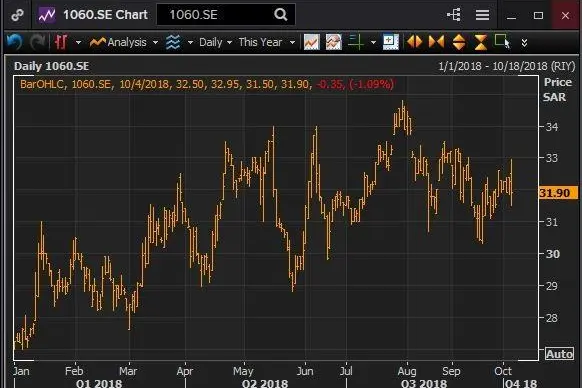PHOTO
Shares in Saudi bank Alawwal gained 2.96 percent while shares in Saudi British Bank (SABB) dropped 1.09 percent on Thursday, after the two banks announced that they entered into a “binding merger agreement”.
“It is expected that the merger will complete during the first half of 2019,” the banks said in a statement.
The deal was first announced in May this year.
Alawwal’s share price has increased by 23.31 percent so far during the year 2018, while SABB gained 18.83 percent.
“If the merger is completed, Alawwal bank shareholders will receive 0.48535396 new SABB shares for each Alawwal bank share (the "Exchange Ratio"). The new shares will be issued by way of a capital increase, which will increase the SABB paid-up capital by 37.0% from SAR 15,000,000,000 to 20,547,945,220 and the number of its issued shares will increase from 1,500,000,000 to 2,054,794,522.” the statement to the exchange noted.
An analyst’s note from Al Rajhi Capital based on three expected senarios calculated the possible returns for both banks.
Under the first scenario of no synergies being created by the merger, Alawwal’s possible return is expected to be of 6.7 percent, SABB’s return would possibly be -3.2 percent.
Under the second scenario, based on synergies of 450 million Saudi riyals, Alawwal’s possible return is expected to be 14.6 percent, while SABB’s return would possibly be 4.0 percent.
Under the third scenario of 650 million riyals of synergies, Alawwal’s possible return is expected to be 18.1 percent, while SABB’s return would possibly be 7.2 percent.
“If you see the upside it is more for Alawwal shareholders” Pritish Devassy, head of equity research at Al Rajhi Capital told Zawya by email.
“I believe it will be better for Alawwal shareholders as they now become part of a stronger entity, with superior profitability, capitalization and credit quality,” Shabbir Malik, a banking analyst at EFG Hermes told Zawya by email.
“Shares of the merged entity should perform well in the medium term as the combined entity will be able to cross-sell a full suite of financial products to a wider range of customers,” Vijay Valecha, chief market analyst at Century Financial Brokers told Zawya by email.
The Saudi market has gained 10.71 percent so far this year and the banking sector has been one of its strong performers, adding 12.62 percent.
“Rising rates and growth in mortgages are likely to be the main drivers for the sector. Saudi’s upgrade to Emerging market should also underpin the banks’ stocks,” EFG Hermes’ Malik said.
The increase in value of the Tadawul index from the start of the year to date can mostly be attributed to active investors taking positions in major Saudi equities following announcements by index compilers FTSE Russell and MSCI that they would add the Saudi market to their respective Emerging Market benchmark indices next year, which is expected to attract billions of dollars from both passive and active foreign funds into the market.
In June, MSCI said it would upgrade the kingdom to emerging market status in phases from mid-2019.
Elsewhere in the region, Dubai’s index retreated 0.83 percent, Abu Dhabi’s index edged up 0.12 percent, Bahrain’s index dropped 0.41 percent, Kuwait’s index lost 0.26 percent, while Qatar’s index edged up 0.13 percent and Oman’s index gained 0.22 percent.
(Reporting by Gerard Aoun; Editing by Michael Fahy)
Our Standards: The Thomson Reuters Trust Principles
Disclaimer: This article is provided for informational purposes only. The content does not provide tax, legal or investment advice or opinion regarding the suitability, value or profitability of any particular security, portfolio or investment strategy. Read our full disclaimer policy here.
© ZAWYA 2018





















